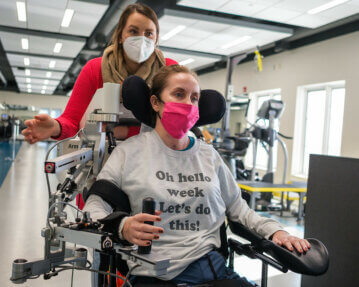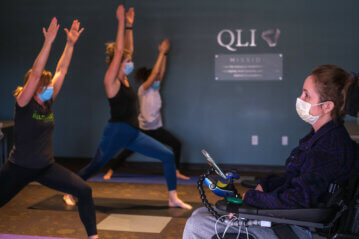In May 2020, Laura Burdick saw herself as a woman at the top of her game. Just 33 years old, the Indiana native was an ambitious, athletic, accomplished professional shouldering a world of responsibility. Both a yoga instructor and personal wellness coach, Burdick found new success in business management — having assumed a leadership role in the expansion of The Hot Room, an Indianapolis-based hot yoga studio.
Success hadn’t come overnight. These were fruits of labor. It had taken ten years of constant learning. Sleepless nights over textbooks. Months of international travel for hundreds of hours of hands-on training.
But it was her passion, and it was the measurement by which she appraised her life.
“Help others be better through health,” Burdick says. “That’s my mission. That’s what I wake up every day to accomplish.”
Around this mission, Burdick’s future possessed an upward trajectory. She was a sure thing, a young woman who had already built entire communities — ardent social media followings and dedicated students — around her coaching. Her work turned an emerging business into one of the region’s leading wellness resources.
And she had inspired countless people, from clients to coworkers to her many friends.
On May 29, 2020, that trajectory changed.
Burdick, at the time driving to The Hot Room’s newest yoga studio location, was struck by a drunk driver. Losing control of their vehicle, the driver careened off the highway — and into Burdick’s car.
Burdick survived. But, the collision dealt traumatic injuries to her brain and catastrophic damage to her spinal cord.
She awoke in a hospital bed. Months had passed. All motor function beneath her shoulders was gone. Every second of life was radically different from everything she knew, seemingly moments before.
Gone were the sure things. There was no telling how long she’d be in hospitals, no telling how long it would be before the feeling in her hands came back, no telling whether she’d ever control her arms or legs.
Against overwhelming uncertainty, Burdick chose calm over chaos.
“I knew I had to stay level-headed,” Burdick says. “Everything can change. You don’t know what’s coming. My goal was just to get to the next day.”
What followed was rehabilitation — lots of it, within some of the nation’s most renowned centers of excellence. It began in Chicago, Illinois, at Shirley Ryan AbilityLab.
Separated from friends and family members by early-pandemic restrictions, Burdick made the first brave steps toward recovery in relative isolation. But she was not alone. Ever the coach, Burdick took to social media — sharing musings on inspiration and gratitude despite the arduous process ahead. She challenged followers to emulate her work — prompting them to set a 90-day goal for improvement.
“What’s your why?” she says. “Why do you care so much? I ask because that’s what I was asking myself every day. Whatever your challenge, you need to assess how your goals line up with your motivation.”
Burdick carried this philosophy to QLI, where she arrived in September 2020. Just months after the accident, her brain had healed to a significant degree. Yet the damage to her nervous system made physical progress a slow, exhausting endeavor.
Nearly every task required additional hands-on support. Functional movements — lifting her hands to touch her face, for instance — demanded months of effort. Occupational therapists, physical therapists, speech-language pathologists, vocational specialists and adaptive technology experts all brought their expertise to bear.
Change came not in milestones, but in increments — subtle day-to-day improvements, the added centimeters of motion a small reward for weeks of targeted repetition.
“It can be hard to not have that ‘big win,’” says Erin Young, Burdick’s occupational
therapist, “but if you look at her change over her time — it’s tremendous. She arrived in a tilt-in-space manual wheelchair. She was completely dependent. Today she’s feeding herself, she’s driving her own wheelchair. Together with her team, Laura has created a lot of independence for herself.”
During rehabilitation, victories accumulate. As a result, that accumulation is something more than relearned skill or regained movement. It is a process of reaffirming identity.
In this way, Burdick’s question became more important than ever: What’s Your Why?
An accident had suddenly and cruelly pulled what mattered from Burdick’s hands. Yet she persevered. And when therapists asked her to teach on-campus yoga classes for a small group of QLI team members, Burdick quickly found purpose in familiarity.
“It was pitched as an exercise to strengthen my diaphragm,” Burdick says, “get me used to projecting my voice again. It was only supposed to be 15 minutes, but the response blew people away.
“So we did it again. And again. Eventually it became 30 minutes every week. Now we have regulars. It’s a normal part of their day.”
Trisha Funk, a speech/language pathologist and clinical admissions liaison for QLI, was one of those regulars practicing under Burdick’s tutelage.
“It was clear Laura was an experienced instructor,” Funk says, “because it would take all of 10 minutes to get the group sweating. But I always felt accomplished afterward, more capable of handling the day.”
She adds, “Laura reminded me why we come to the mats in the first place. I loved that.”
The yoga sessions became a fixture of life at QLI. Burdick commanded the attention of students hailing from all levels of experience — and that group of students grew by the week. Word of Burdick’s classes stretched back to her Indianapolis studio and culminated over the holiday season in virtual lessons that welcomed more than 100 clients and friends, all familiar faces eager to see Burdick, even if through the soft glow of a Zoom call.
In no small terms the moment served as affirmation. Whether for a small class or a triple-digit virtual audience, here was proof that Burdick’s personal mission could. She could deliver on that promise no matter the circumstance.
Laura Burdick was, indeed, the sure thing. She was an achiever, someone who surpasses expectation and sees gratitude and growth in every experience.
“Laura refuses defeat,” says Young. “She’s had to flex those resilient muscles through a lot of hardship. But she does so gracefully. That kind of grace is a choice. Laura chooses to be brave.”
HOW DO YOU SEE YOURSELF?
Burdick has a vision for her future. She returned to Indianapolis not as a brain and spinal cord injury survivor, but as someone who understands loss and the difficulty of recovery. She inspires precisely because of her choice to rise from the aftermath of injury.
Ultimately, identity is not a concept. It is an action.
Burdick settles on a self-label. She turns a wry smile at the word’s double-meaning — the reference to her yoga background and its everyday definition.
“I’m a warrior,” she says. And she leaves it at that.
Categories: Adaptive Sports, Brain Injury, QLI Magazine, Spinal Cord Injury


